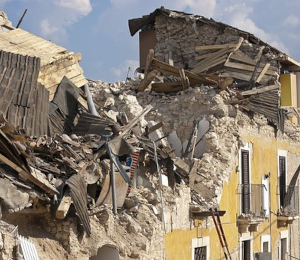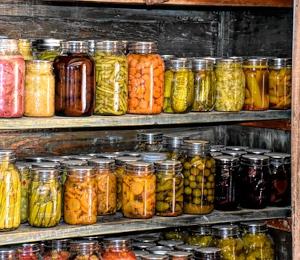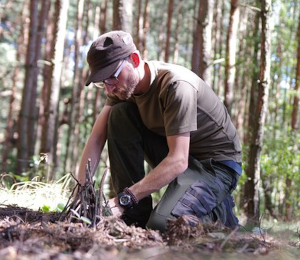
Why talk about home chemical emergencies?
Chemicals are a natural and important part of our environment. We use chemicals every day. They are found in our kitchens, medicine cabinets, basements, garages, and gardens. Chemicals help us keep our food fresh and our bodies clean. They help plants grow and fuel our cars. And chemicals help us to live longer, healthier lives. When used properly, the chemicals normally found in a home pose little threat. When used improperly, in adverse conditions, or for jobs for which they were not intended, chemicals can be harmful, even deadly.
Knowing how to handle chemical products and how to react if an emergency should occur can reduce the risk of injury.
What is a home chemical emergency?
A home chemical emergency is a dangerous situation that arises when chemicals are spilled, accidentally released, or used improperly. Some chemicals that are safe, and even helpful in small amounts, can be harmful in larger quantities or under certain conditions. Most chemical accidents occur in our own homes and can be prevented.
How can I protect myself from chemical emergencies at home?
Anyone of any age can be adversely affected by chemicals or other substances through breathing, swallowing, or touching. A person can be exposed to a chemical even though he or she does not see or smell anything unusual. The best way to avoid chemical accidents is to read and follow the directions for use, storage, and disposal of chemical products.
What is the best source of information if a chemical emergency occurs at home?
If a chemical spills from the container of a household product, read the product label for instructions or call 9-1-1 or your local emergency number. If you know or have reason to believe that exposure to the chemical may cause poisoning, call the Poison Control Center at 1-800-222-1222. If your pet appears to have been exposed to a poison or other toxin, call your veterinarian or the Animal Poison Control Center at 1-888-426-4435.
How can I properly dispose of household hazardous waste?
People sometimes dispose of household hazardous wastes improperly, causing danger to humans, animals, the environment, sanitation systems, etc. Call your local or state solid waste officials or recycling or environmental agency to learn how to dispose of specific hazardous wastes so they will not cause harm.
Be Prepared for Household Chemical Emergencies: Protect Yourself
- Use, store, and dispose of chemicals according to instructions.
- Post the Poison Control Center number by every telephone.
- Know the symptoms of chemical poisoning.
You should:
- Dispose of chemicals according to the instructions on each product’s label. Disposing of chemicals properly ensures that they will not adversely affect the safety of the environment and the health and well being of the public, including your household.
Note: If you have questions about how to dispose of chemicals or products that may contain chemicals, call your local or state solid waste officials or recycling or environmental agency.
- Read the instructions before using a new chemical product and be sure to store household chemicals according to the instructions on the label.
- Store chemicals in a safe, secure location, preferably up high and always out of the reach of children.
- Avoid mixing household chemical products. Deadly toxic fumes can result from the mixture of chemicals, such as chlorine bleach and ammonia.
- Never smoke while using household chemicals. Avoid using hair spray, cleaning solutions, paint products, or pesticides near an open flame, pilot light, lighted candle, fireplace, wood-burning stove, etc. Although you may not be able to see or smell them, vapor particles in the air could catch fire or explode.
- Clean up spilled chemicals immediately with rags. Protect your eyes and skin by wearing gloves and goggles or safety glasses. Allow the fumes in the rags to evaporate outdoors, and then dispose of the rags by wrapping them in newspaper, placing them in a sealed plastic bag, and putting them outside in your trash can.
- Buy only as much of a chemical as you think you will use. If some of the chemical is left over, try to give it to someone who will use it or dispose of it according to the instructions. Storing hazardous chemicals increases the risk of chemical emergencies.
- Keep an A-B-C-rated fire extinguisher in your home. Get training from your local fire department in how to use it. (See Fire Extinguishers.)
- Protect your pets and other animals from possible exposure to all chemicals
- Post by all telephones the Poison Control Center number (1-800-222-1222), the Animal Poison Control Center number (1-888-426-4435), and your local emergency number (9-1-1 or the emergency number in your area).
- Recognize the symptoms of chemical poisoning:
- Difficulty breathing
- Irritation of the eyes, skin, throat, or respiratory tract
- Changes in skin color
- Headache or blurred vision
- Dizziness
- Clumsiness or lack of coordination
- Cramps or diarrhea
- Nausea
What to Do if a Chemical Emergency Occurs at Home
If a person eats or drinks a non-food substance, you should immediately:
- Find the container the substance came in and take it to the telephone. (Medical professionals may need specific information from the container to give you the best emergency advice.)
- Call the Poison Control Center at 1-800-222-1222.
- If directed to do so, call 9-1-1 or the emergency number in your area.
- Follow carefully the instructions of the Poison Control Center operator and the EMS dispatcher. Be aware that the first aid advice found on containers may not be appropriate. Do not give anything by mouth unless medical professionals advise you to do so.
If a chemical gets into a person’s eyes, you should immediately:
- Call the Poison Control Center at 1-800-222-1222.
- Flush the eyes with clear water for a minimum of 15 minutes or take other action as directed by the Poison Control Center. Delaying first aid can greatly increase the likelihood of permanent injury.
CORE ACTIONS
- For chemical poisoning, immediately call the Poison Control Center and begin treatment.
- If fire or explosion threatens, get out, and then call for help.
If a person is burned by chemicals, you should immediately:
- Call 9-1-1 for emergency help.
- Administer first aid.
- Remove clothing and jewelry from around the injury.
- Pour clean, cool water over the burn for 15 to 30 minutes.
- Loosely cover the burn with a sterile or clean dressing so it will not stick to the burn.
If there is danger of a chemical fire or explosion, you should:
- Get out of the building immediately. Do not waste time collecting items or calling the fire department.
- Once you are safely away from danger, call the fire department from outside using a cell phone or a neighbor’s telephone
- Stay upwind and away from the building to avoid breathing toxic fumes.
If you have been exposed to toxic chemicals, you should:
- Wash your hands, arms, or other body parts that may have been exposed to a toxic chemical. Chemicals may continue to irritate the skin until they are washed off.
- Remove your clothing, being careful not to pull it over your face. Cut the clothing off if necessary.
- Discard clothing that may have been contaminated by toxic chemicals. Some chemicals may not wash out completely. Discarding clothes will prevent potential future exposure.
Protect your animals
Be aware that animals are more likely to explore substances within their reach, particularly those with an attractive odor (including substances such as chocolate which are toxic to most pets). Animals will often lick their paws, fur, or skin and swallow a substance that they have walked in. Wash your animals’ paws and coat if necessary and prevent licking as much as possible until you have taken the animal to your veterinarian.
Learn More
Learn about the chemicals that could pose a threat to you and members of your household. Contact agencies with expertise on hazardous household materials, such as the Poison Control Center, local public health department, or county or municipal office responsible for environmental protection. Get information from them about potentially dangerous household products and what to do if someone becomes poisoned with them. Ask specifically about how to treat poisoning caused by cleaners, germicides, deodorizers, detergents, drain and bowl cleaners, gases, home medications, laundry bleaches, liquid fuels, and paint removers and thinners. Always call the Poison Control Center first (1-800-222-1222) before treating these or any other poisoning.
Read More













